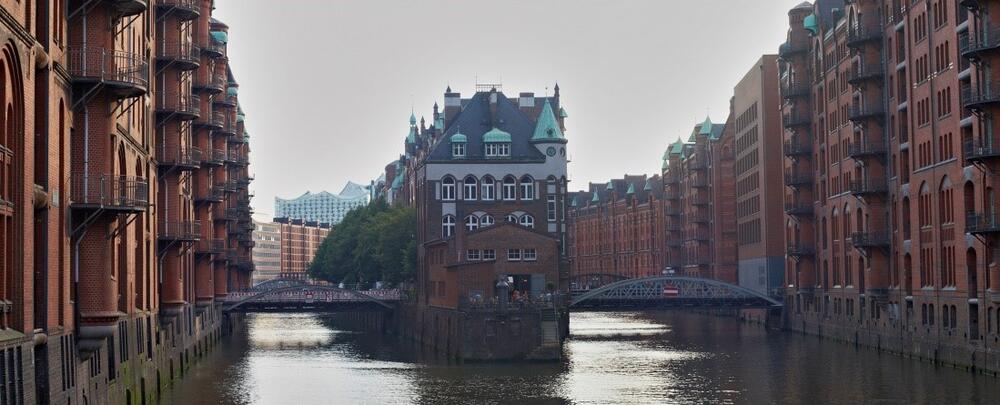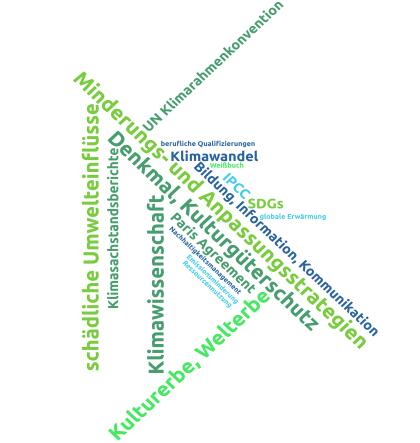CCHIP-Projekt: Connecting culture, heritage and the IPCC (Intergovernmental Panel on Climate Change)
International project funding
Subject and goals of the project
Environmental changes in the course of climate change affect cultural heritage in sometimes serious ways. In 2013, for example, the UN Framework Convention on Climate Change Warsaw International Mechanism for Loss and Damage (UNFCCC) listed cultural heritage among the areas threatened by the impacts of climate change and called for appropriate responses to loss and damage. At the same time, important policy documents – the UN Sustainable Development Goals (SDGs), the UN Sendai Framework for Disaster Risk Reduction 2015-2030 (2015) or the New Urban Agenda (2016) – emphasize the role of cultural heritage for sustainable development and call for increased conservation efforts in this regard. Yet, despite its relevance, the issue receives little attention in the global climate discourse. Thus, it is addressed only fragmentarily in the previous reports of the Intergovernmental Panel on Climate Change (IPCC).
The project is therefore the first scientific survey of the current state of knowledge on the relationship between climate change and cultural heritage. It is planned to organize an international meeting of experts in cooperation with the Intergovernmental Panel on Climate Change (IPCC) and UNESCO. Four main topics are planned:
- Preparation of topic-specific white papers by experts that address the current state of research and discussion and the work of the IPCC to date and provide the basis for discussion at the subsequent expert meeting
- Organization of an international expert meeting with representatives from science, research and practice to derive recommendations
- Organization of a discussion forum with experts from Germany; the contributions will be incorporated into the white papers and the final expert meeting
- Hosting of a second final forum for German stakeholders on the results
The results of the expert meetings will be incorporated into IPCC reporting. The project outcome will be a multilingual meeting report summarizing the elaborated results of the white papers and the expert meeting. It will include recommendations for the necessary steps to adapt to the impacts of climate change.
The project is technically accompanied by the German National Committee of ICOMOS, by UNESCO Paris and by the IPCC.
Innovation and exemplary nature of the project
The project is innovative and at the same time of high environmental relevance. The project is the first to provide a comprehensive evaluation of climatic changes on cultural and natural heritage. Previously published studies, such as Climate Change and World Heritage (UNESCO, 2007) or Weathering Uncertainty: Traditional Knowledge for Climate Change Assessment and Adaptation (UNESCO, 2012), do not represent the current state of research and are thus not a sufficient basis for meaningful conservation measures. More recent reports such as the UN Sendai Framework or the UN Sustainable Development Goals (SDGs) only address partial aspects and do not represent an inventory. The project thus initiates the first in-depth analysis on a global scale. It helps to identify previous findings and research gaps regarding the impacts of climate change on cultural heritage and to identify relevant conservation measures.
The recommendations to be elaborated in the project provide the necessary scientific framework to integrate findings in the thematic field of cultural and natural heritage into future IPCC reporting. Depending on the results, it is envisaged that they will be considered in the upcoming seventh IPCC cycle either in the seventh Assessment Report (WP 7), in the planned special report on cities and climate change, or in the form of a separate special report on cultural heritage and climate change. The IPCC reports are a widely cited source on the current status of climate change impacts and thus an important basis for science-based policy decisions. Collaboration with the IPCC will allow, for the first time, the challenges in the cultural and natural heritage sector to be more visible in climate science, society, and the field.
Special aspects of the project
The project also makes an important contribution to the implementation of the goals of the Paris Agreement (2015) and the 2030 Agenda for Sustainable Development to commit member states to measures that mitigate climate change and limit global warming to below two degrees Celsius compared to the pre-industrial era.
It also responds to a long-standing call by UNESCO's World Heritage Committee to intensify cooperation between States Parties and the Intergovernmental Panel on Climate Change (IPCC) to protect cultural and natural heritage. At its 40th Annual Meeting in Istanbul in 2016, the UNESCO recommended strengthening relationships with organizations working on climate change, including IPCC and the United Nations Framework Convention on Climate Change (UNFCCC) secretariats, among others, with regard to the impacts of climate change on World Heritage.
Funding subject: Preservation and safeguarding of nationally valuable cultural assets from harmful environmental influences
Applicant:
Locations:
- France (Charenton-le-Pont)
- worldwide
Funding period: December 2020 to December 2021
Project costs: Total volume: 253 300 Euro, DBU funding: 121 355 Euro
DBU-AZ: 37226
Note: Translation of the German version with DeepL
Last updated: 16.11.2021



